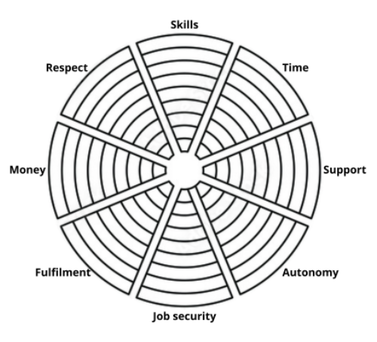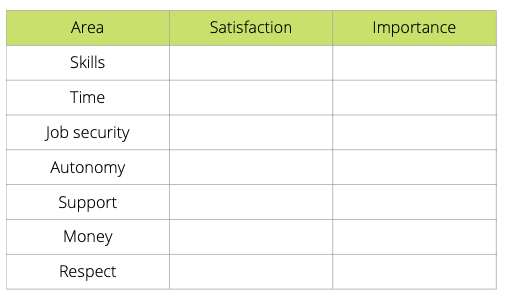|
One of my very favourite tools for taking stock is a values assessment. Values define who we are and what matters to us. When we find ourselves in situations where our values are compromised, we can become stressed and anxious. When we hold goals that are in conflict with our values or don’t address enough of our values, we tend to procrastinate because the tension stops us being able to make progress. Values do change over time depending on circumstances. By being aware of our values, we are in a better position to:
Use this list to identify the 10 values that are most important to you. Then order them in terms of their importance to you.
Click here if you would like an at-a-glance page summarising the tool. Please get in touch if you have any questions and do share your experiences of using this tool in the comments area below.
0 Comments
 My favourite starting point for taking stock is to take a measure of where you are right now, in a holistic sense, to answer the question “how are you doing in all areas of your life?”. The Wheel of Life is a great tool for that. In its most basic form, it is a circle divided into 8 sections. Each section is devoted to an area of your life. The example on the right focusses on career, but the tool can be adapted to suit whatever circumstances you need to explore. Essentially, you rate each area of your life on a scale of 1-10 in terms of how satisfied you are with that facet of your life and then how important it is to you. The second rating is very important because it isn't worth spending time on on something that you don't care about much! You might find it useful to use a table like the one below: By getting it out of your head and on to paper, you are able to see how you are doing and how important that is to you. It helps you decide what needs your attention and offers a glimpse of what might happen if you chose not to pay attention.
Click here if you would like an at-a-glance page summarising the tool. Please get in touch if you have any questions and do share your experiences of using this tool in the comments area below. Photo by Guille Álvarez on Unsplash 3 tools to help you decide what’s best for you right now You are in a job you’ve had for a while. Some things are going well, you might love your team or the work that you do or the location, but something isn’t quite right. You try to ignore the niggles because there is so much that you like about the job that it seems ungrateful to even think about the downsides. Every so often, especially in the middle of the night, you try to weigh up your options and make a decision only to flip back into uncertainty minutes/hours/days later. Sound familiar? I have a few tools that can help you make up your mind: 1. Pros and cons This is an old favourite but don’t let that put you off because it works. List out what is great and what is not good about each option. Try and be as thorough as you can be, so that you tease out all the genuinely good and bad things about your current place of work versus going elsewhere. 2. Ask your future self for advice Imagine you could speak to your older, wiser self and ask their advice on this dilemma. What would he/she say? Sit down in a nice quiet spot, take a few slow deep breaths and imagine travelling in time to visit yourself in your later years. Take your time and enjoy the journey and try to take note of the detail of your future life. Ask your elder self to advise you on what you should do now. You may be surprised with the advice you get! 3. Cartesian questions René Descartes (1596-1650) was a French mathematician, scientist, and philosopher. Aside from his famous pronouncement “I think, therefore I am” he also invented a method of deductive reasoning that consists of four rules: (1) accept nothing as true that is not self-evident, (2) divide problems into their simplest parts, (3) solve problems by proceeding from simple to complex, and (4) recheck the reasoning. You can use that logic to ask yourself the following questions about each side of your dilemma:
The questions are designed to go from straightforward to totally confounding, which helps flip a mental switch and moves people into a much more creative state of mind.
I hope you find these tools useful. I often use them myself or with clients. I'd love to hear your experiences of using them! |
Author25 years experience in helping teams build user centred products and services, now helping digital colleagues learn how to bounce back better than before from the challenges life throws at us from time-to-time. Archives
December 2022
Categories
All
|



 RSS Feed
RSS Feed